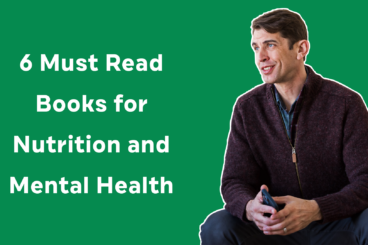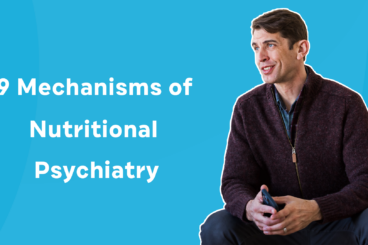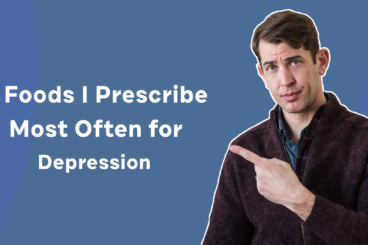Depression levels are at an all-time high. Unlike heart disease and cancer, mental illness strikes at earlier ages. In fact, among people aged 15 – 44, depressive disorders are the leading cause of disability worldwide. And in 2020, depression will be the top cause of disability in the US for the first time.
If you don’t suffer from depression, you may wonder how this applies to your life. The reality is that we are all at risk for brain illnesses such as depression, just as we are all at risk for heart disease and cancer.
What we cook for our family and friends is one of our most powerful weapons to help prevent illness. Extensive research shows that the quality of your food directly relates to your risk for depression.
To take this a step further, I wanted to understand which foods would pack the most nutritional punch for patients with depression. My colleague Laura R LaChance, MD and I identified the key nutrients that influence depression and calculated the Antidepressant Nutrient density for each food that translated into an Antidepressant Food Score (AFS). To my knowledge, this is the first study — just published in the World Journal of Psychiatry — to use a nutrient profile scale to focus on brain health.
In the past, researchers have looked at how single nutrients like B12 or specific food groups like seafood could protect against depressive disorders. They also determined how processed foods such as those high in refined carbohydrates or sugar could contribute to depression risk.
Among those studies:
- A meta-analysis showed higher amounts of fruit and vegetables, fish, and whole grains could lower depression among adults.
- Another meta-analysis found adhering to the Mediterranean diet — rich in colorful plant foods and fish — could reduce risk for depression by 30 percent.
- A systematic review found that higher intakes of foods with saturated fat, refined carbohydrates, and processed food products led to worse mental health among children and adolescents.
A few years ago, the first randomized controlled trial found that what you eat could help treat or prevent brain-based disorders, especially depression.
Researchers here found “significant reductions in depression symptoms” from dietary interventions, independent of other factors including smoking rates or physical activity.
And this has been the motivation for our study — the one I mentioned earlier about the Antidepressant Food Score (AFS) — we took this dietary approach to depression to a very practical place. This score helped us determine the most nutrient-dense foods to help prevent and promote recovery from depressive disorders.
Looking at the 34 known essential nutrients, we isolated 12 antidepressant nutrients:
- Iron
- Omega-3 fatty acids (EPA and DHA)
- Magnesium
- Potassium
- Selenium
- Several B vitamins: Thiamine, folate, B6, and B12
- Vitamin A
- Vitamin C
- Zinc
What foods have the most of these nutrients? Among animal foods, oysters were top with a 56 percent AFS. Several other shellfish including clams and mussels topped that list.
But plant foods really took the prize. Check out these numbers:
- Watercress — 127%
- Spinach — 97%
- Mustard, turnip, or beet greens — 76%-93%
- Lettuces (red, green, romaine) –74%-99%
- Swiss chard — 90%
- Fresh herbs (cilantro, basil, or parsley) — 73%-75%
- Kale or collards — 48%-62%
- Cauliflower — 41%-42%
- Broccoli — 41%
- Brussels sprouts — 35%
What becomes so clear in this study are a core of our clinical work. Instead of specific foods, we focus on food categories that clinicians and patients alike can use to manage depression.
These foods are literally the top brain foods.
And what was the clear winner in this study?
Plants! Unfortunately, very few of us eat enough vegetables. In fact, the Centers for Disease Control and Prevention (CDC) says 9.3 percent of Americans eat enough vegetables. This is one reason that the burden of disease – from heart disease to depression – continues to increase.
I want you to eat more vegetables, period, but I also want you to optimize the benefits of vegetables to help support your brain health and to help protect your and your loved ones from depression. Here are five ways how to do that.
-
- Eat more fermented vegetables. Fermented vegetables like kefir and sauerkraut contain various species of bacteria associated with health benefits, namely species of Lactobacillus or Bifidobacterium. Foods that contain live bacteria cultures are “probiotics.” Research shows that these good gut flora can potentially alleviate depressive symptoms.
- Feed your good gut bugs. You want to populate your good gut bugs with probiotics, but you also want to feed those bugs. (They are living creatures, after all!) Chicory root, Jerusalem artichoke, dandelion greens, garlic, leeks, asparagus, and onions are excellent sources of prebiotics, which your good gut bugs or probiotics feed on.
- Leafy Greens and Rainbows. This is a simple brainfood test. Look at your plate. Is it filled with multiple colors? Leafy greens? I try to get these food categories in at almost every meal because they are so nutrient dense.
- Add Fats. You absorb some molecules in plants, like vitamin K and fat-soluble phytonutrients like lycopene, when you add fats. In Eat Complete, I only used olive oil, coconut oil, and butter for the recipes. I’d guess 80% of the fat calories we eat come from olive oil. It should be the oil you use the most in my opinion.
- Do the best that you can. Frozen organic vegetables are a good value and equivalent to fresh vegetables in terms of nutrients. Remember that organic matters more for some foods, such as kale and peaches (which are eaten whole), than others, such as onions and sweet potatoes (which are peeled). Use the Environmental Working Group’s (EWG’s) 2019 Shopper’s Guide to Pesticides in Produce™ to determine what vegetables you absolutely want to buy organic. You can also ask your local farmers (if possible) about their produce, as many small farms aren’t officially certified organic but still grow food free of pesticides.
No doubt we’ll see more research examining how food can impact depression, but you needn’t wait for researchers to catch up on what we already know and this new study proves: Eating more nutrient-dense leafy and cruciferous vegetables is one of the few ways that research suggests we can protect ourselves and our families against depression. Your brain health starts at the end of your fork.
To your health,
Drew
If you’re a practitioner interested in integrating nutritional psychiatry into your practice, check out my nutritional psychiatry training at Omega Institute.



